Ahmad Massoud: the face of Afghanistan’s anti-Taliban resistance
Son of famed anti-Soviet militia leader staging fightback in Panjshir Valley
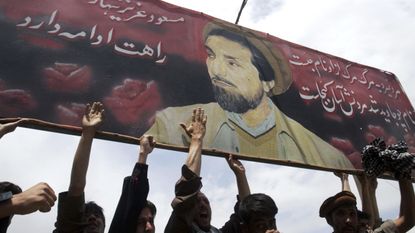
Thousands of fighters have flocked to the Panjshir Valley in northern Afghanistan to join a militia led by a 32-year-old with a family history of anti-Taliban resistance.
Ahmad Massoud, son of the famed anti-Taliban leader Ahmad Shah Massoud, has pledged to “fight back against a return to the hardline Islamist organisation’s authoritarian rule of the country”, The Independent reported, making the valley “a centre for resistance” for the first time since the Taliban was deposed two decades ago.
The emergence of the National Resistance Front of Afghanistan (NRF), led by Massoud and the former vice-president of Afghanistan Amrullah Saleh, has made the Panjshir Valley “a bastion of resistance” following the Taliban’s takeover of the country, Al Jazeera added, with Massoud pledging to “follow in his father’s footsteps and never surrender”.
Subscribe to The Week
Escape your echo chamber. Get the facts behind the news, plus analysis from multiple perspectives.

Sign up for The Week's Free Newsletters
From our morning news briefing to a weekly Good News Newsletter, get the best of The Week delivered directly to your inbox.
From our morning news briefing to a weekly Good News Newsletter, get the best of The Week delivered directly to your inbox.
‘The Lion of Panjshir’
Ahmad Massoud is the son of Ahmad Shah Massoud, a militia leader known as “The Lion of Panjshir” who led a resistance first against the Soviet occupation of Afghanistan in the 1980s and then against the Taliban’s rule over the country in the 1990s.
Shah Massoud, who served as defence minister of the Islamic State of Afghanistan during efforts to unite the country’s warring factions in the late 90s, was assassinated in 2001, two days before the attacks on the World Trade Centre in New York.
The assassination is widely considered to have been ordered by Osama Bin Laden to aid his Taliban protectors in Afghanistan and ensure he would have their co-operation following the deadliest terror attacks on US soil.
New Yorker journalist Dexter Filkins, who reported on the invasion of Afghanistan for The New York Times, has suggested that the murder was carried out because Shah Massoud would have been a key ally for the US when it later fought alongside the Northern Alliance, a military alliance of rebel groups, against the Taliban.
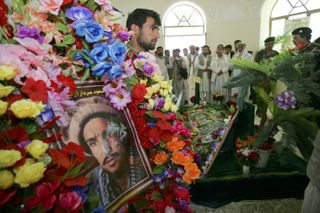
Ahmad Massoud, his father’s only son, trained for a year at Royal Military Academy Sandhurst and studied in the war studies department at King’s College London. He also holds a master’s degree in international politics from City, University of London.
After returning to Afghanistan, he was appointed CEO of the Massoud Foundation, a non-profit organisation that provides support to poor Afghans in the areas of “culture, health, training and education”.
A critic of the peace negotiations between the Trump administration and the Taliban, he formed a new coalition of mujahideen leaders – modelled on the Northern Alliance that his father helped found in the 1990s – before declaring his opposition to Taliban rule following their sweeping gains in recent months.
Writing in The Washington Post last week, Massoud said that “common struggle is more essential than ever in these dark, tense hours for my homeland”. He said that he is “ready to follow in my father’s footsteps, with mujahideen fighters who are prepared to once again take on the Taliban”.
He called for aid from “Afghanistan’s friends in the West”, adding that his supporters “share your values” and want “an open society” where “girls could become doctors, our press could report freely, our young people could dance and listen to music or attend soccer matches in the stadiums that were once used by the Taliban for public executions”.
‘We do not want a war’
The number of fighters currently operating under the banner of the NRF is thought to be “more than 6,000”, Al Jazeera reported. However, “while he is prepared to fight, Massoud has said he still hopes to hold peaceful talks with the Taliban”.
Speaking to Reuters, he said that his militia “want to make the Taliban realise that the only way forward is through negotiation”, adding: “We do not want a war to break out.” Asked how his supporters would respond if the Taliban attempted to take the Panjshir Valley by force, he said: “They want to defend, they want to fight, they want to resist against any totalitarian regime.”
For Massoud, “France is the most natural place to turn as he tries to marshal a resistance army”, Politico said, as his father remains “a household name” in the country and “lives on as the country’s epitome of a freedom fighter thanks to his battles against the Soviets and Taliban in the 1980s and 1990s”.
He also has an “intermediary with the top echelons of power” in Paris, the French public intellectual and philosopher Bernard-Henri Levy, who travelled to the Panjshir Valley to write a story on him for the magazine Paris Match last October.
Writing on Unherd last week, Levy said that “Massoud has been quietly preparing for the worst and stockpiling arms, equipment and supplies, as his father had done”, adding: “I trust him.”
“I believe him when he says he inherited from his father the taste for freedom and the instinct of fighting to defend it,” Levy continued. “I believe that when he issues a call for all free Afghans who love their country and reject servitude, whether living in Afghanistan or abroad, to join him, he is not only sincere but credible.”
For the NRF’s supporters, “surrender is not an option”, The Telegraph said. But “in the face of the Taliban’s overwhelming military superiority and lacking international support”, the paper added, Massoud may be forced to “choose between capitulation and his vow to fight to the last breath if he cannot reach an honourable settlement”.
However, inspired by Shah Massoud’s battle against the Soviet Union, the NRF appears undeterred.
“The Red Army, with its might, was unable to defeat us,” Ali Nazary, head of foreign relations for the NRF, told the BBC.
“I don’t think any force right now in Afghanistan has the might of the Red Army. And the Taliban also 25 years ago tried to take over the valley and they failed, they faced a crushing defeat.”
Create an account with the same email registered to your subscription to unlock access.
Sign up for Today's Best Articles in your inbox
A free daily email with the biggest news stories of the day – and the best features from TheWeek.com
-
 'Good riddance to the televised presidential debate'
'Good riddance to the televised presidential debate'Instant Opinion Opinion, comment and editorials of the day
By Harold Maass, The Week US Published
-
 Caitlin Clark the No. 1 pick in bullish WNBA Draft
Caitlin Clark the No. 1 pick in bullish WNBA DraftSpeed Read As expected, she went to the Indiana Fever
By Peter Weber, The Week US Published
-
 Today's political cartoons - April 16, 2024
Today's political cartoons - April 16, 2024Cartoons Tuesday's cartoons - sleepyhead, little people, and more
By The Week US Published
-
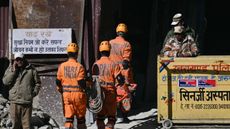 Puffed rice and yoga: inside the collapsed tunnel where Indian workers await rescue
Puffed rice and yoga: inside the collapsed tunnel where Indian workers await rescueSpeed Read Workers trapped in collapsed tunnel are suffering from dysentery and anxiety over their rescue
By Sorcha Bradley, The Week UK Published
-
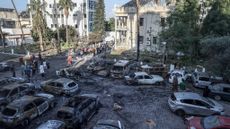 Gaza hospital blast: What the video evidence shows about who's to blame
Gaza hospital blast: What the video evidence shows about who's to blameSpeed Read Nobody wants to take responsibility for the deadly explosion in the courtyard of Gaza's al-Ahli Hospital. Roll the tape.
By Peter Weber, The Week US Published
-
 Giraffe poo seized after woman wanted to use it to make a necklace
Giraffe poo seized after woman wanted to use it to make a necklaceTall Tales And other stories from the stranger side of life
By Chas Newkey-Burden, The Week UK Published
-
 Helicopter sound arouses crocodiles
Helicopter sound arouses crocodilesTall Tales And other stories from the stranger side of life
By Chas Newkey-Burden, The Week UK Published
-
 Woman sues Disney over 'injurious wedgie'
Woman sues Disney over 'injurious wedgie'Tall Tales And other stories from the stranger side of life
By Chas Newkey-Burden, The Week UK Published
-
 Emotional support alligator turned away from baseball stadium
Emotional support alligator turned away from baseball stadiumTall Tales And other stories from the stranger side of life
By Chas Newkey-Burden, The Week UK Published
-
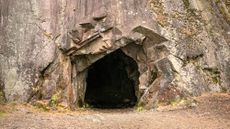 Europe's oldest shoes found in Spanish caves
Europe's oldest shoes found in Spanish cavesTall Tales And other stories from the stranger side of life
By Chas Newkey-Burden, The Week UK Published
-
 Artworks stolen by Nazis returned to heirs of cabaret performer
Artworks stolen by Nazis returned to heirs of cabaret performerIt wasn't all bad Good news stories from the past seven days
By The Week Staff Published